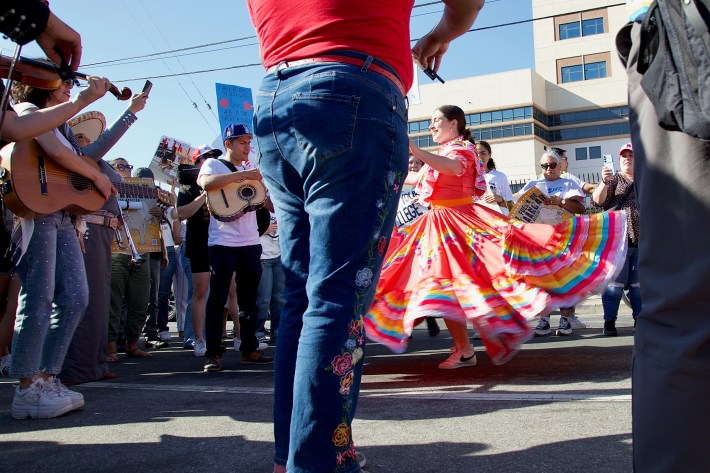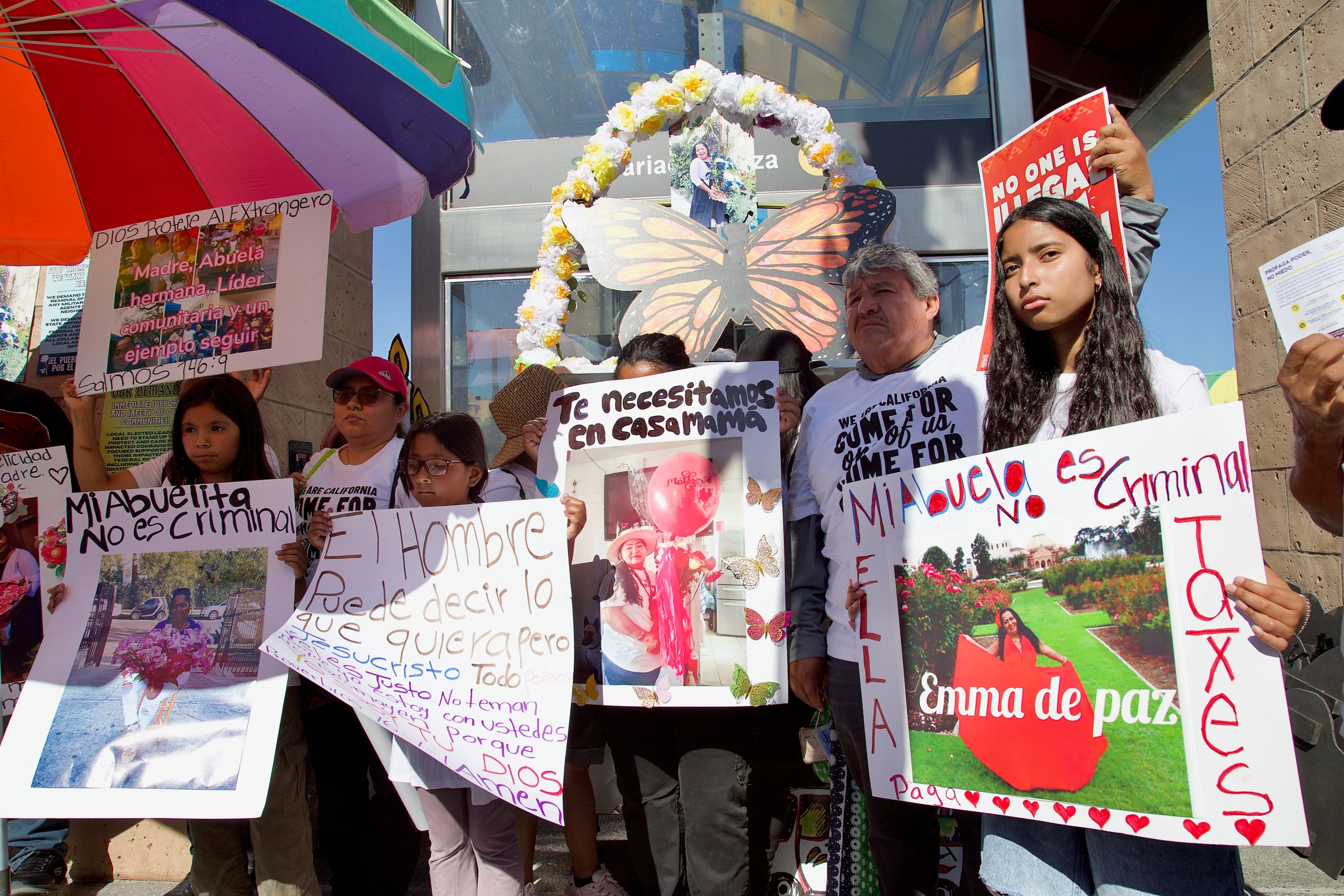It happened so fast, Joel says of the June 19 abduction of 58-year-old street food vendor Emma de Paz from the Hollywood Home Depot by ICE.
Eight nor nine unmarked vehicles pulled up, a few dozen masked agents poured out, and suddenly he saw panicked laborers and vendors taking flight in terror.
The agents had chased them around the parking lot and up and down surrounding streets, eventually detaining a dozen or so people – Emma included – as well as an American citizen.
And although the Trump administration continues to claim ICE agents are not engaging in racial profiling, witnesses on site had told L.A. Times reporters Brittny Mejia and Rachel Uranga that the agents appeared to be grabbing at darker-skinned people first, including Home Depot customers.

It had been a traumatic scene, Joel agrees.
He’d first met Emma at that very Home Depot a decade ago, he says. She’d always been like a mother to him.
That relationship had brought him and his dog to Mariachi Plaza to join the hundreds of other supporters gathered there to demand Emma's immediate release.

__________
The "Reclaim Our Streets" event in Boyle Heights, one of four held across L.A. Tuesday evening, offered Eastside residents the increasingly rare opportunity to safely be in community as they honored Emma and the other approximately 2,000 people ICE has disappeared over the past month.
Because “reclaiming streets” on the Eastside has always been about creating space for culture, joy, remembrance, celebration, healing, and resistance, participants wearing "Come for one of us, come for all of us!" shirts danced and sang, marched and chanted, built altars and made signs, listened to heart-wrenching testimonies, demanded an end to the raids and the immediate release of those detained, and pledged to keep showing up for each other.
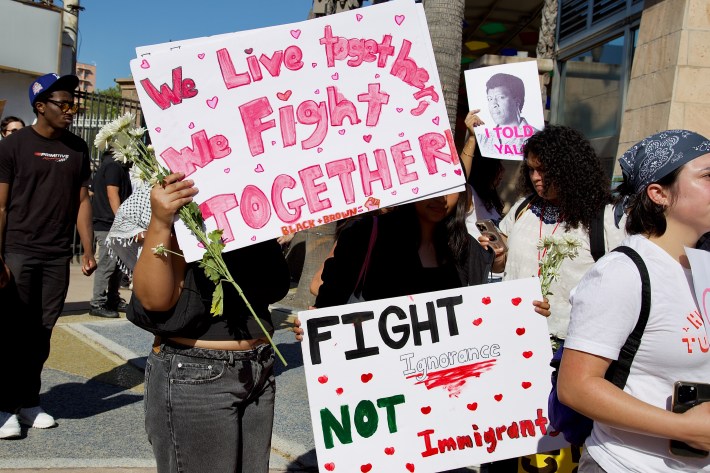
Even those who did not participate felt embraced.
Two elderly neighbors watching marchers head for White Memorial Hospital (where Emma had initially been held under guard) applauded the protest and the mariachi music that had drawn them out to their front porch.
"It's been quiet here so far," one said in Spanish. But pointing toward the home where a number of male mariachis regularly stayed, she observed that their doors - which had generally been left open before - were always closed now.
"The mariachis are fearful," she said. "What can we do?"
Emma's brother, Carlos Barrera de Paz, had some ideas.
When the march paused in front of White Memorial, he took to the mic to shame the Trump administration.
The country he knew was a democracy that believed in the rule of law, he told the crowd in Spanish. He and his family had also believed in following the law, he said. Which included paying fines on the rare occasions they got tickets.
Emma's work as an organizer with the L.A. Street Vendor campaign also spoke to how much those values had meant to her. For over a decade, she had actively fought to legalize street vending - bringing it out of the shadows and subjecting it to regulation - so that she and her peers could be legally integrated into the local economy and work without fear.
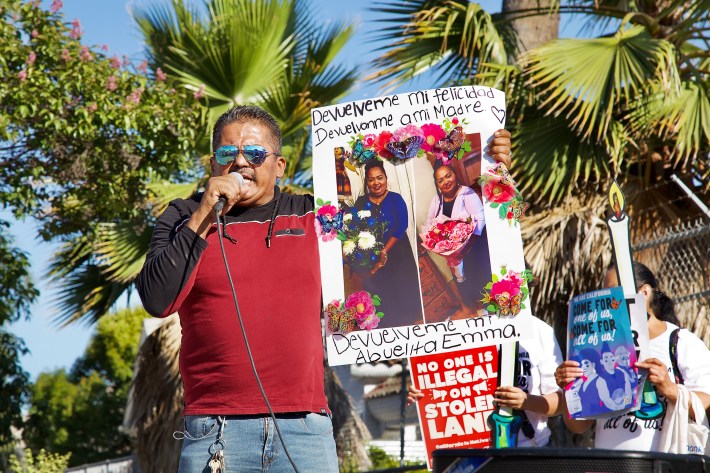
Yet, while hard at work at her stand - just as she had done for the last 25 years - men dressed for battle chased his sister down like an animal, threw her to the ground, pointed weapons at her, and bundled her into a van, said Barrera.
As of Tuesday night, he said, she had spent eight days without access to a shower or a solid meal. Instead, she'd been handed a few cookies here and a piece of a sandwich there, while also being denied the medications and health care she needed.
Such tactics were injust, inhumane, violent, and more akin to those of a terrorist government, he said. "Criminales no somos!" [We are not criminals!] he repeated.
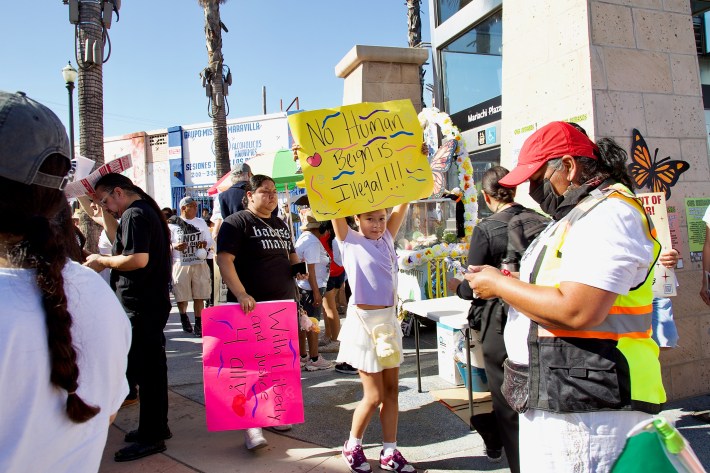
Indeed they are not.
As has now been well-documented, the overwhelming majority of those detained since ICE began ramping up its activities do not have criminal records. Of those that do, the majority of offenses were nonviolent. And although the Trump administration prefers not to acknowledge this, simply being present in the U.S. as an undocumented person is not a criminal violation. It's a civil one.
Moreover, as Angelica Salas of CHIRLA explained to City Council a few weeks ago, the width of the nets ICE has cast means that many of those ensnared have been in the U.S. for decades. And while the administration might claim detainees have outstanding orders of deportation, Salas said, "Most of these folks have never had any contact with immigration."
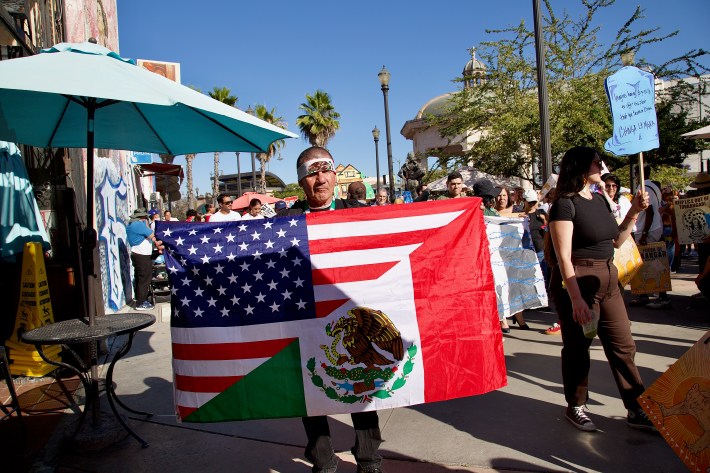
These hard-working folks are the people the U.S. owes so much to, a speaker who asked only to be identified as Margarita told the crowd at Mariachi Plaza.
"If this country is great, it is thanks to the hands of [exploited] workers" that gave their bodies and souls to lift it up, she said in Spanish.
"Those of us that came here didn't come by choice or for pleasure. We came out of necessity. And we lost so much along the way."
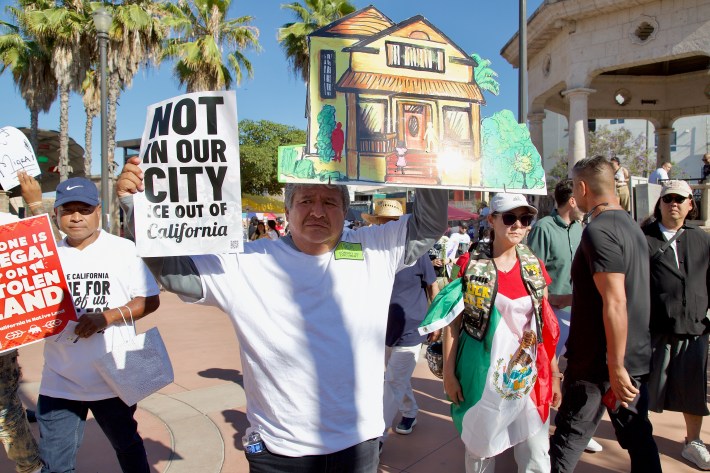
__________
Street vendors are especially vulnerable these days.
As they are outdoors and often work alone, they generally have nowhere to hide. But with many averaging just over $10,000 a year in income, they also can't afford not to work.
Still, the shocking images of fruit vendors being snatched off corners and abandoned ice cream carts and flower buckets providing the first clues that vendors might have been disappeared have been hard for their peers to ignore.
Vendors are "living through terrorism," Esmeralda, a street vendor who had been in the U.S. for 35 years, told the crowd in Spanish.
"We're not here to hurt anyone," she said. But as people who paid taxes and were significant contributors to the economy, she said, vendors were tired of "being treated like delinquents."
"Support us with a rent freeze," she suggested, referencing the list of demands organizers had posted on pillars around the plaza. "How are we supposed to pay our rent if we can't work?... Our children are afraid that we might not come home if we go out to work."
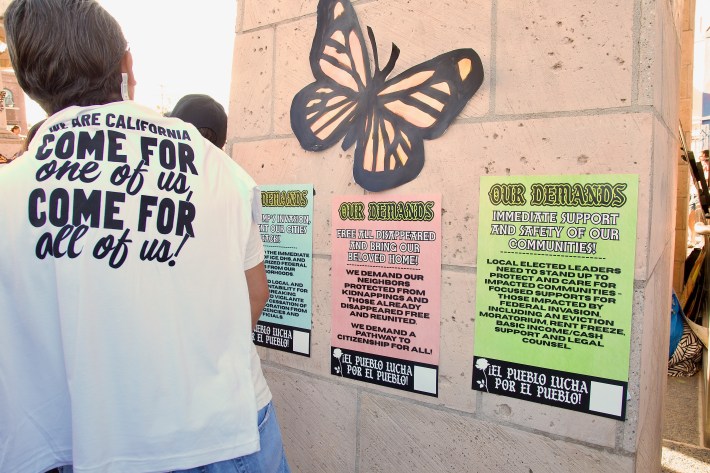
While some of those children have taken over their families' stands to keep their parents safe, others have concluded it's safer for their families if they don't call attention to themselves. The mentor of one such youth read the frightened teen's letter aloud to the crowd.
In it, the recent high school grad described the stress of having to step up and be the man of the family when his father was suddenly detained during a routine check-in. Although a judge had previously told his father he couldn't be deported, the ICE agent had dismissed that opinion, telling his father, "That's not the orders of the president."
Thankfully, his father is going to be returned to L.A. and released, he wrote. But his uncle - like so many others from his community - was still detained and about to be deported. "This," he concluded, "is what the media should be focused on."
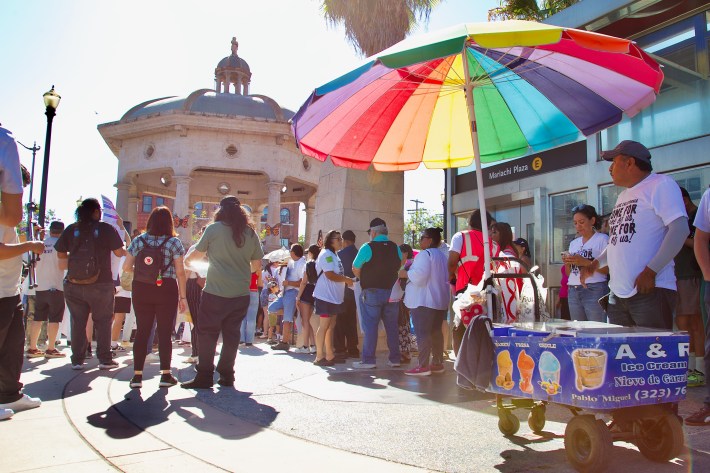
__________
In his remarks, Henry Perez, Executive Director of Inner City Struggle (one of the event organizers), acknowledged the terror inflicted on the community was very real. But he also took a moment to forcefully call out the "performative" nature of the raids.
The aggressive tactics were designed "to make us afraid - to get us to acquiesce and not challenge the authoritarian regime’s attempt to rule over our communities,” he said.
He was adamant that that would not work here. "In Los Angeles and in the Eastside we fight back!" he declared. "We will march and rally in the streets against injustice! ...We will do whatever it takes to take care of one another! ...We will show up wherever ICE is...to show the world what this cruelty looks like in our communities.”
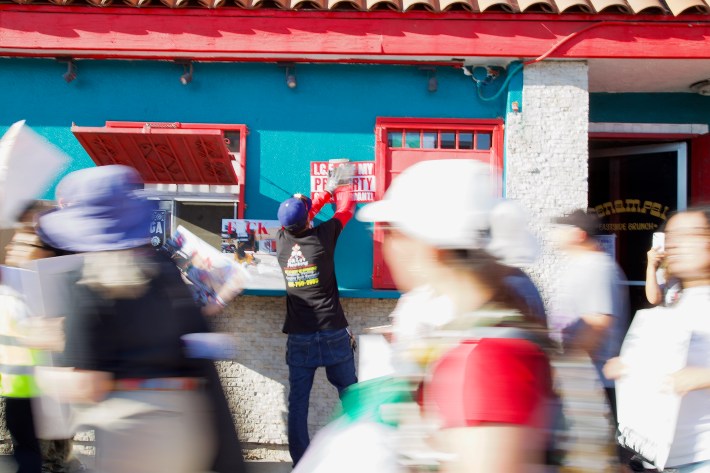
The willingness of Angelenos to challenge ICE has had a tangible impact, noted Kristian Cardenas (also of Inner City Struggle).
The speed with which the Rapid Response Network is able to verify ICE sightings, alert community members, document any actions taken, and track abductions appears to have forced the agencies to change up their tactics to keep the element of surprise, he explained.
But ICE also behaves in unexpected ways. Like when agents deliberately crashed into, pulled their weapons on, and then teargassed a vehicle carrying a couple and their two children just down the street from Inner City Struggle's offices. In that case, ICE snatched the driver - Christian Damian Cerno-Camacho, a U.S. citizen - and fled the scene before shocked witnesses could fully piece together what had just happened (below).
And the morning after the "Reclaim" event, federal agents were spotted pulling a delivery driver out of his truck at Whittier and Orme.
__________
In other words, the Trump administration is not done punishing Los Angeles. Or immigrants, wherever they may be.
The passage of Trump's Big [insert your preferred descriptor] Bill will pour $171 billion into federal immigration enforcement and, according to American Immigration Council fellow Aaron Reichlin-Melnik, hand ICE more money per year for the next four years "than the budgets of the FBI, DEA, ATF, U.S. Marshals, and Bureau of Prisons combined." It more than doubles ICE's current detention capacity. The House version of the bill budgets for another 10,000 ICE officers, suggesting they will be a presence in immigrant communities for several years to come. And it sets aside at least $14 billion to entice local law enforcement to partner with federal authorities.
Those that refuse to work with federal authorities may be rewarded with lawsuits, as Los Angeles was this past Monday.
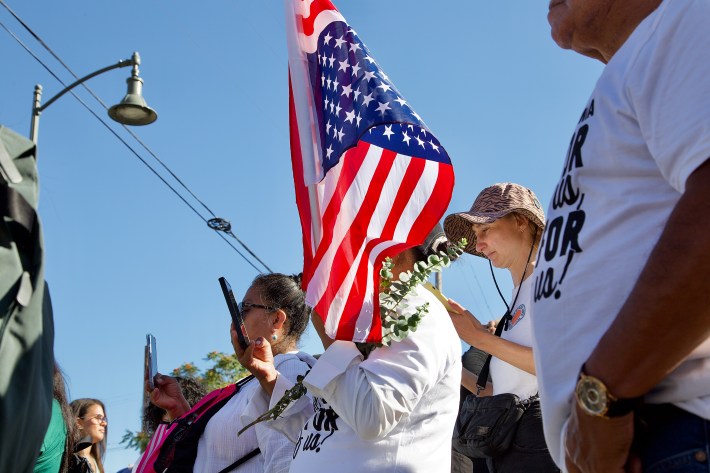
But L.A. is digging in its heels.
Local news outlets L.A. TACO, L.A. Public Press, and Boyle Heights Beat keep Angelenos abreast of rapidly changing conditions on the ground. Local organizers have retooled mutual aid networks and fundraisers to help supplement the needs and incomes of immigrants who are too afraid to work or families whose loved ones have disappeared. The groups doing community patrols have inspired everyday Angelenos to act as look-outs at worksites, disrupt the slumber of ICE agents, and even thwart ICE and Border Patrol activities. And day laborer Network NDLON has called out Home Depot (where so many raids have taken place) while Unión del Barrio and other groups have called for an outright boycott in the hopes of getting businesses to stand up for their workers and customers.
City Council is working to further limit LAPD's ability to support of ICE operations. County Supervisors are contemplating their own lawsuit. And two new lawsuits - one by immigrants rights groups (regarding the warrantless arrests, denial of access to counsel, and deplorable conditions in which detainees are held) and another by a U.S. citizen that was wrongfully detained - seek to challenge the administrations flagrant flouting of both the Constitution and federal law.
State and national lawmakers are looking for ways to force federal agents to identify themselves. And even California Republican lawmakers have urged the administration to target violent criminals instead of conducting workplace raids that sow fear among all employees and ultimately disrupt the local and state economies.
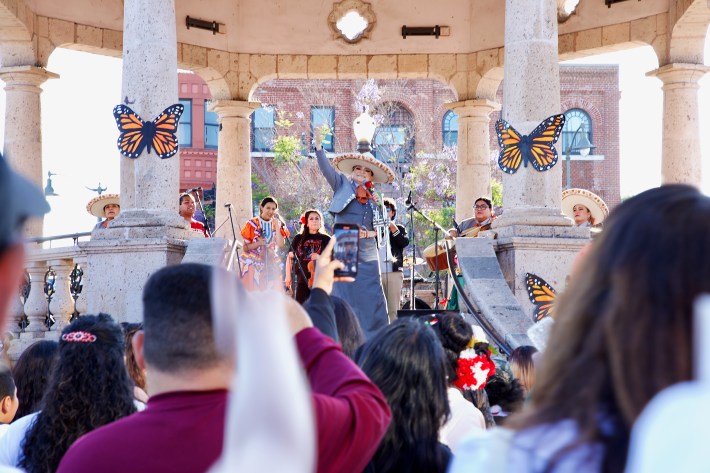
The fight to reclaim L.A.'s streets isn't over yet.
But the month-long assault on Los Angeles has laid bare just what it means - and how much effort it takes - to ensure our streets are safe, accessible, and welcoming for everyone.
__________
If you'd like to support some of the mutual aid efforts on the Eastside, check out the L.A. Street Vendor Campaign's gofundme for street vendors, Inner City Struggle's mutual aid fund, the work of Raíces con Voz, or the guide from Boyle Heights Beat.
